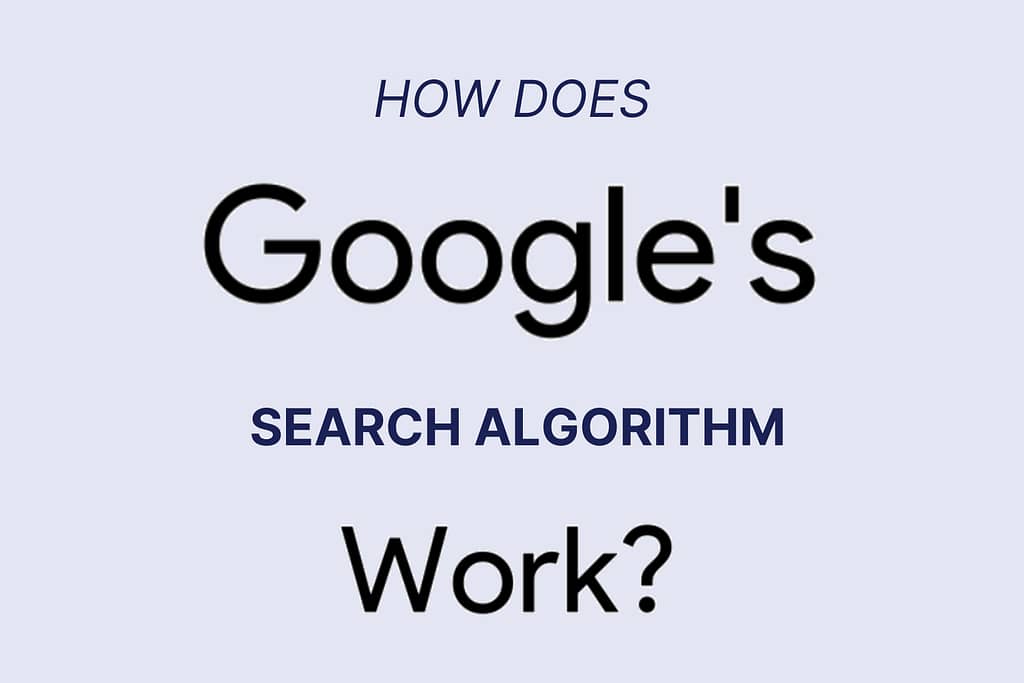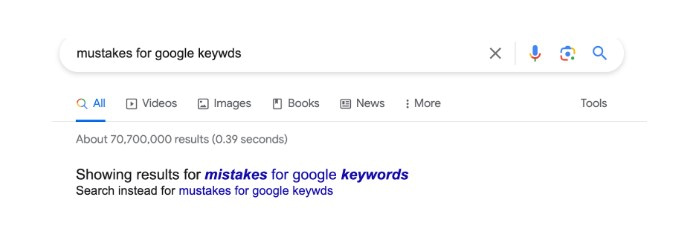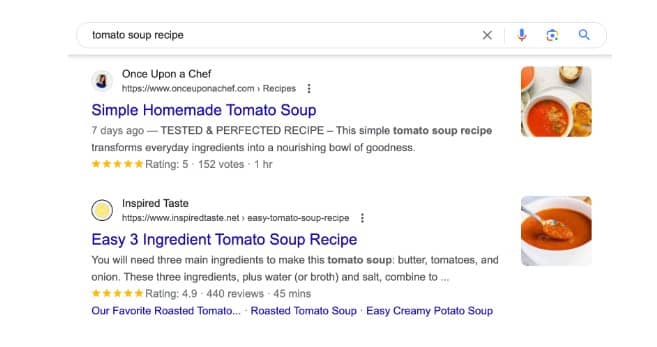
Article Takeaways
- The Google search algorithm is a set of rules that determines which web pages to prioritise in the search results.
- The algorithm can have major updates once or twice per year. Minor updates can be daily.
- Google doesn’t advertise all of its ranking factors, but it prioritises meaning, relevance, quality, usability and context.
- You should never try to trick the Google search algorithm. Black hat tactics can cause your website to be penalised by Google.
What is the Google Search algorithm?
The Google search algorithm is a mathematical formula Google uses to provide search results that match the user’s search query. The algorithm considers hundreds of “ranking factors,” like keywords, URLs, user experience, backlinks and much more.
You can think of the Google search algorithm as a set of criteria. If your web page has the right qualities, it will be displayed higher in Google’s search results.
That’s important because the top 3 search results account for 54.4% of all clicks on Google’s search results.
There are hundreds of ranking factors, and Google is very secretive about what’s important and what’s not. Broadly speaking, the algorithm breaks its ranking factors into 5 main categories:
- Meaning
- Relevance
- Quality
- Usability
- Context
The more you understand each of these categories, the easier it is to create web pages that rank. This is a crucial part of Search Engine Optimisation.
You’ll learn more about these factors below, but you may also be interested in our How the Google Search Engine Works guide.
The Key Factors in Google’s Search Algorithm
Here’s a rundown of the major factors that the Google algorithm uses to crawl, index and serve results. We’ve also included some tips on how to optimise your current website to suit these factors.
1. Meaning
Google is a semantic search engine. This means it looks at the “Meaning” behind the search term, not just the words themselves.
Why does that matter? Words and phrases can have different meanings depending on the context, and Google prides itself on serving personalised, relevant search results.
For example, let’s say a user searches for “Holden Astra”. They may be buying or selling their car, looking for mechanical advice, or seeking reviews. We call this intent. Google will try to determine the most likely intent and then tailor the results to suit.
But semantic search goes beyond intent. It also helps Google to serve the perfect search results, even if you aren’t sure what you’re searching for.
Consider typos in your search queries. If Google was a literal search engine, it wouldn’t know how to correct your spelling and provide relevant results. Luckily, Google has no trouble parsing errors:

What does this mean for site owners? Contrary to what you might have heard, Google does not prioritise the keywords on your website. Instead, it looks for the underlying meaning of each web page.
This means you need to show Google the “Meaning” behind your content.
Start with:
Meta titles and Descriptions
Every web page should have a meta title and description. These provide a clear picture of the meaning behind the content on each page of your website. The meta title and description are also shown in the SERPs:
- The meta title should be under 60 characters. It will usually be similar to the page title. So, for this article, it may be “How Does the Google Search Algorithm Work?”
- The meta description should be under 160 characters. It’s a snippet that explains what the content is about. It should be descriptive and start with a word like discover, find or learn. For this article, we could use “Learn how the Google Search Algorithm Works. Our guide packed with expert tips to help you improve your search engine rankings.”
Writing meta titles and descriptions is equal parts art and science. They can be a serious factor in getting your content to rank, so it’s worth learning how to optimise your metadata.
Questions and Answers
Another way Google determines the meaning of a web page is with questions and answers. A simple FAQ section at the bottom of the page can be the key to providing more in-depth information to Google and to your users!
Not sure what to put in your FAQs? Input a relevant keyword into Google and check out the “People also ask” and “Related Searches” sections on the SERP. Always try to answer the question in the first sentence of your content, and provide additional information in the following paragraphs.
2. Relevance
The next Algorithm factor is “Relevance.” Google doesn’t want to serve vague results – it wants highly targeted information for every search.
This attention to detail is why Google has a global market share of around 83.49%. If you want to improve your chances with the algorithm, always be relevant to your target audience.
The most important consideration here is keywords. This is an area most SEO professionals focus on. If you’re not sure where to start, read our guide on the Basics of Keyword Research.
Google will look for keyword patterns that match the search query. For example, if a user searches “tomato soup recipe” they won’t be looking for veggie gardening tips. They want cooking suggestions. If we continue with this example, you can see the top-ranking pages all contain variants of the phrase “tomato soup recipe”.

Think about what you want to rank for and use this information to research potential keywords. The Google Keyword Planner tool provides suggestions that are relevant to your target market.
Here are a few rules to follow when using keywords on your web pages:
- Write quality content – this will help to build authority and trust
- Make your visitors happy – don’t try to trick users with irrelevant keywords
- Keep it natural – Google will understand the meaning of a keyphrase, even if the term isn’t an exact match
Avoid keyword stuffing – red flags will go up if you use the same keyphrase too many times
3. Quality
The next ranking factor to consider is “Quality.” The internet has around 200 million active websites. A significant proportion of these websites are inactive, spammy or low quality. To keep its reputation, Google only wants to feature the best of the best.
Google’s algorithm has been designed to assess the quality of a page. A high-quality page will be from a reputable website that meets the E-E-A-T guidelines – Experience, Expertise, Authoritativeness and Trustworthiness.
The quality of a page is assessed using dozens of factors. This includes the quality of the content, referencing, backlinks, the authoritativeness of the author, and much more.
One important way to show your page is high-quality is with backlinks. A backlink is when an external URL links to a page on your website. This boosts your credibility in the eyes of Google.
After all, an unrelated website wouldn’t be linking to you if you didn’t have quality content, right?
It may be tempting to try to manipulate the game with sneaky tactics. For example, some website owners put their backlinks on hundreds of low-ranking sites to inflate their authority. Even if there’s some short-term gain, this type of behaviour can lead to harsh penalties.
Using these “blackhat” tactics may cause Google to remove your website from the search results. Human reviewers can take manual action if your site isn’t compliant with the company’s policies.
When it comes to backlinks, you should be aiming for genuine links from reputable websites. The best way to achieve this is to write high-quality, consistent content that showcases your expertise and provides value to the reader.
4. Usability
If there are two similar pages that both have high quality, relevant content, how does Google choose which one comes out on top? It can come down to “Usability.”
The algorithm considers the user experience. How easy is your site to navigate? Are there any issues that could annoy your visitors?
For example, popups and intrusive ads can be distracting, and people will often leave at the sight of them. This equates to a poor user experience and low usability.
A website that’s mobile-friendly will also stand out. There are more than 7 billion mobile users worldwide, so you can’t focus on desktop users alone. You can use the free PageSpeed Insights tool to see if your page is compatible with smartphones.
Another factor Google considers is page speed. The gold standard is for pages to load in less than 2 seconds. The faster your page loads, the less likely visitors will be to get frustrated and go elsewhere.
Here are our top tips to improve your page loading speed:
- Diagnose any issues using the PageSpeed Insights tool
- Make sure your website is mobile-friendly
- Remove unnecessary code
- Optimise and compress images
- Limit redirects
- Reduce Javascript execution time
The bones of your website also matter. Your pages need to be easy to navigate for both humans and web crawlers. You can read this guide on Technical SEO for more details.
5. Context
When people search, they usually want localised results. This is where “Context” comes in.
Google will try to customise the SERPS to suit the individual. The user’s search history, geographical location and browser settings all have an effect on the search results that are displayed.
For example, if someone is looking for an in-person service, they usually want results that are close by. After all, the website for a plumber in California won’t be very helpful to a person living in Melbourne.
Even generalised content should meet the context criteria. An article like this one may be useful to website operators all over the globe, but there are still limits. We’ve written this in English, so it’s unlikely to be served to users in countries that don’t speak English.
References and slang can also be country-specific. If we say “Crack open a tinny and get set for an SEO shake-up,” an Aussie will get it. But someone in the UK or US might not. This can impact where our content is displayed and whether it’s useful to people in other localities.
If you are a local service business, incorporate your location into your content. It can be as simple as using the keyphrase “experienced plumber in Brisbane” instead of just “experienced plumber.”
When you incorporate context into your digital marketing, you’ll target the right people. As a result, your rankings will improve, and you’ll be able to reach the right users.
Where to Find Google Algorithm Updates
As a business owner, you probably don’t have time to keep up with all the algorithm updates. If you stick with the tips we’ve just shared, your content will have a good chance of ranking well. Of course, your SEO manager will be in the loop and revise your strategy as required.
But, if you do want the latest information you can add these to your bookmarks list:
- Gordon Digital Knowledge Centre
- Google Search Status Dashboard
- Google Twitter (X) Page
- Google Search Central Blog
Understanding the Basics of Google’s Search Algorithm
SEO is complex, and Google is constantly moving the goalposts. With regular updates to its algorithm, gaining (and keeping) a high ranking can be a competitive process.
Despite the challenges, there are a few factors that never change. To give users a positive search experience, Google focuses on Meaning, Relevance, Quality, Usability and Context.
There are a few strategies you can implement right now. For example, make sure all of your web pages have meta descriptions so that Google can match them to a user’s search intent. You can also add relevant keywords, localise web pages to your area and improve the quality of content.
It’s easy to say, but these things all take time. If you don’t have enough hours in the day, the team at Gordon Digital can help your website get to the top of Google’s Search Results!
Gordon Digital specialises in Search Engine Optimisation. We design strategies that have a real impact on your bottom line. When you need sales, leads and new customers, our specialists can craft an SEO strategy to match.
Contact Gordon Digital to book a strategy session, or get in touch to see how we can help your business!

